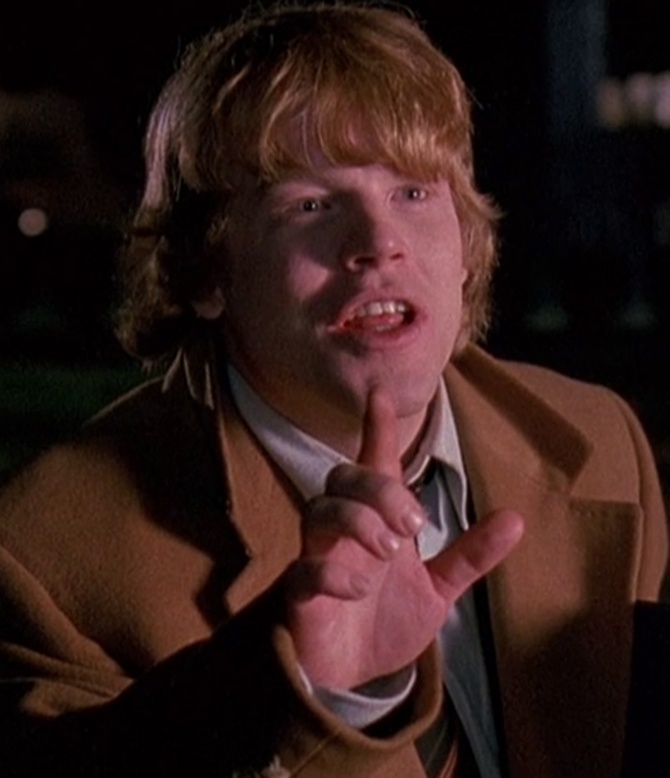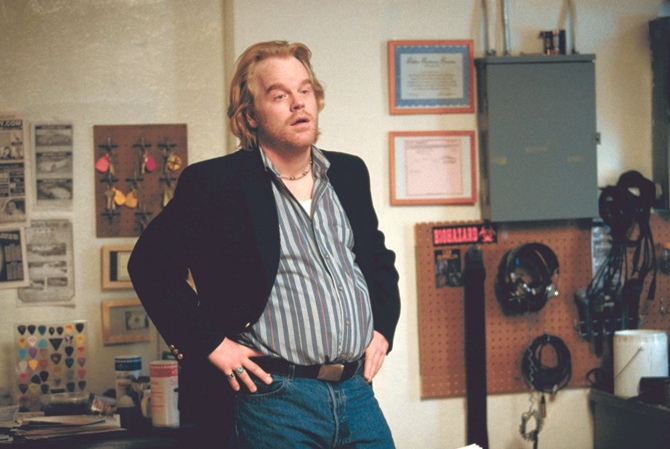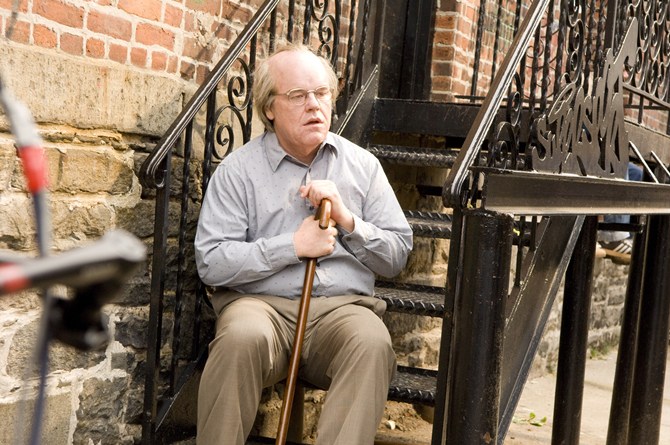
'To surprise us every single time, come what may...'
'To show us a simple enough boxed-up character and then spring out in a way we could never anticipate...'
'And now he's dead. Before the devil could know it.'
Raja Sen salutes Philip Seymour Hoffman, perhaps the finest actor of his time.
That fat guy.
The first time I saw Philip Seymour Hoffman was in Scent Of A Woman, playing an uppity prep-school bully.
I vividly remember that floppy hair falling onto his round face, scrunched up all the time, as if the sun was glaring right into his eyes even in the shade.
That fat guy who made the sickeningly sweet hero appear noble, that fat guy with the smirk of superiority spread across his mug.
He began popping up in notable movies, movies like Patch Adams and When A Man Loves A Woman which got a lot of television-time, and genuinely great movies where he played weirdos, like Boogie Nights and Magnolia and The Big Lebowski.
Here was a young and seemingly fearless guy, a guy deftly turning into one of those character actors New York Times reviewers call 'reliably excellent.'
Please ...

Then, in a landmark Cameron Crowe movie called Almost Famous, he played legendary rock critic Lester Bangs and guided many of my generation about journalism.
Too cool to act cool, he acerbically gave us the straight dope: About life and faith and conviction and rock, and when I turned film critic a few years later, I picked his words as my survival mantra: 'You cannot make friends with the rock stars. That's what's important. If you're a rock journalist -- first, you will never get paid much.'
'But you'll get free records from the record company. And they'll buy you drinks, you'll meet girls, they'll try to fly you places for free, offer you drugs... I know.'
'It sounds great. But they are not your friends. These are people who want you to write sanctimonious stories about the genius of the rock stars, and they will ruin rock and roll and strangle everything we love about it.'
(Thank you, PSH. Truly.)
It takes a lot to sell words that fiendishly simple, and Hoffman did it with such authority that while he might not have been the film's leading man, he emerged its brightest light.
Its golden god, as it were.
Please ...

And it was in him we found a man willing to debase himself, to play the fool, to go out on whatever limb was furthest, all for the glory of the movie.
The length of the role never mattered, and -- unlike in A Late Quartet, which contained one of his finest performances -- Hoffman had no trouble playing second violin.
Soon it became clear that he was one of those special actors who made an impression no matter what cinematic world he inhabited.
In 2004, he appeared in a hideous film called Along Came Polly, a Ben Stiller vehicle where Hoffman's Sandy Lyle spoke candidly about 'sharting', a grotesque scatological gag about how he defecated while breaking wind, and did it so often he'd had to coin a word for it.
It was an unfortunate film, and I wondered whether he was to be mired forever in material so clearly beneath him.
Please ...

One year later, he won the Best Actor Oscar for Capote: A performance where this grizzly giant turned small and fey purely by mannerism; a performance that, through its cold mercilessness, remains a scalding critique of writer Truman Capote.
Suddenly it became clear that this man could do anything at all.
He could be funny, vicious, profane, cunning, brilliant, slackjawed, omniscient, obsequious, perverse, perfect -- and he shone each time, often more dazzling than the films he was in.
A lumbering large man who -- when need be -- could swiftly twist and burst into song, nimbly tangoing with a roomful of naked women.
Please ...

That fat guy.
Even that girth seemed to affect different approaches in service to the material: He could be genially plump, imposingly Falstaffian, a bloated artist, a chubby romantic, a stout sibling, a flabby film-writer..,
And all while staying the same size. To paraphrase something an iconic actor once told another icon who shared Philip Seymour's last name: Other performers starved for parts or stuffed themselves with protein, but Hoffman acted.
His filmography boasts of some of the finest directors of all time: Sidney Lumet, The Coen Brothers, David Mamet, Mike Nichols, Cameron Crowe.
And his most significant collaboration was fittingly with a filmmaker regarded the most talented of his generation.
Paul Thomas Anderson cast Hoffman whenever he could, and the duo grew together -- from Hard Eight to Boogie Nights to Magnolia to Punch-Drunk Love to The Master -- bold and defiant and majestic, rising dizzyingly past any expectations.
Please ...

The last few years showed his willingness to hurtle past any boundary, to endow simple parts with bittersweet nuance, and to dare writers to come up with a performance that would be a challenge.
Charlie Kaufman scooped up the gauntlet and wrote the impossible Synecdoche, New York -- about an artist who creates a New York within New York, one that mirrors his shambolic life through a warped lens -- and Hoffman trounced the writing, rising above the meta-trickery and giving us a bravura performance that might well be his legacy.
A blowhard and a nitpicker, a failure and a bastard, a genius and a true visionary.
It's all there, and thanks to his propensity to stun us, that might not even be part of your top three Philip Seymour Hoffman films.
That, in fact, might have been his greatest feat. To surprise us every single time, come what may.
To show us a simple enough boxed-up character and then spring out in a way we could never anticipate.
He'd roll up his sleeves, make us understand and believe and wait, and then -- with a flourish, while his patter enchanted us -- the stubbly master would yank a rabbit out of his baseball cap.
Always without warning. Always off-guard.
And now he's dead. Before the devil could know it.